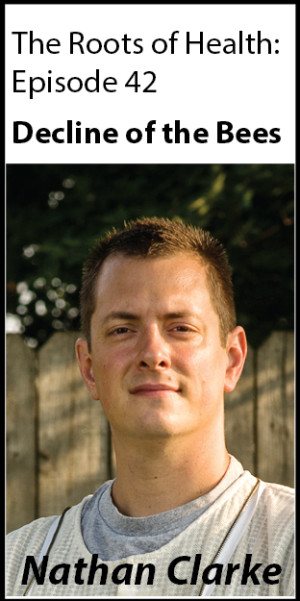 Click here to go right to the show in iTunes or on WebTalkRadio.net.
Click here to go right to the show in iTunes or on WebTalkRadio.net.
When you think about bees, do you think about being stung, or having an allergic reaction, or maybe honey? Let’s take a bigger picture perspective and recognize them for the gigantic service they do for us as pollinators. Today, about 1/3 of the produce in our markets is brought to us by the humble honeybee. And at the same time that we have planted a 300% increase in crops that require their pollination services, honeybee colonies have been collapsing at a rate of 30% (up to 60% locally) every year. What is it about their environment that is taking such a huge toll on their health?
My guest today will help me to answer this question. Nathan Clarke is a beekeeper that started a business called Mad Urban Bees, and he’s doing his part to support a healthy bee population in backyards and on rooftops in and around Madison, WI.
Nathan and I chat about honeybee behavior and what constitutes a healthy colony, the real reasons (and they know what they are) behind the precipitous decline in the bee populations, and what part that you can play to help maintain a healthy bee population in your area.
Side Note from Meredith: Honeybee ARE a canary in the coalmine. We can see the results of their malnourishment leading to decreased immunity + increased environmental toxins… they are compromised by a lack of nutrients and a dysfunctional food system… and we should sort of look in the mirror and ask ourselves, are we next?
Nathan’s Bio: Nathan Clarke is owner and founder of Mad Urban Bees LLC, an urban apiary located in Madison, WI. His beehives are located in the cities of Madison and Middleton and are hosted in backyards, back lots, and on rooftops. These bees pollinate the gardens, flowers and trees of the city and produce a honey that is unique to Madison.
Nathan is a self-taught beekeeper of ten years. He now manages over 90 hives in the Madison area, including Olbrich Botanical Gardens. He teaches beekeeping classes throughout the year.
Mad Urban Bees honey is extracted in small batches, is never blended or heat-treated, and contains local pollen. Healthier bees mean better tasting, healthier honey!
You can subscribe to The Roots of Health at WebTalkRadio.net and also on iTunes.


